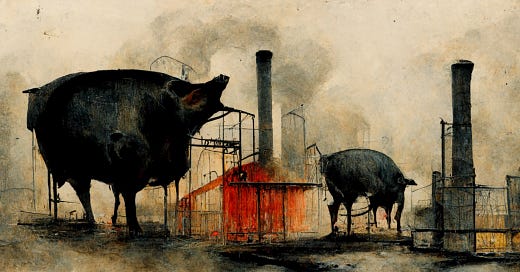Cultural speciesism shouldn’t be primary focus
I was watching a recent edition of Roger Yates’ YouTube program, The Animal Rights Show, and found myself stuck on something the host said. I don’t mean to pick on Yates. I have a lot of respect for the activist. His comments were merely emblematic of a perspective that is commonplace in the nonhuman movement, that I am in growing disagreement with.
“I always say our number one target is cultural speciesism,” Yates said. If I understand him correctly, Yates is arguing that if we could just get rid of prejudicial attitudes humans have toward other creatures, than the use of animals for entertainment, science, food and clothing would disappear. This has been accepted wisdom as long as I’ve been in the nonhuman movement.
I’m not an academic and wouldn’t qualify as a doctrinaire Marxist even if I was. Still, I’ve been interested in the distinction within the socialist tradition between base and superstructure. In this context, base refers to the productive forces of society, like tools, materials and factories. Superstructure refers to a society’s ideological system, such as laws, religion and art.
Yates, and most of the animal movement, so far as I’ve experienced it, seem to believe superstructure primarily influences the base. In other words, cultural speciesism is driving the use of animals. I never really questioned this formulation until I started thinking more about these concepts of base and superstructure. You see, Marxists believe the base primarily influences the superstructure.
They reverse the formulation. From this perspective, the use of animals is driving cultural speciesism. “Social relations are closely bound up with productive forces,” Karl Marx wrote. “In acquiring new productive forces men change their mode of production; and in changing their mode of production, in changing the way of earning their living, they change all their social relations.”
When you start to consider the animal movement’s belief that superstructure primarily influences the base, you begin to see it everywhere. For instance, I was reminded of a book I read about 15 years ago, Animal Equality by Joan Dunayer. The text is about how speciesism infects language. The author provides non-speciesist alternatives to various demeaning terms.
I can’t recall the title well enough to say whether this was stated or not, but the assumption seemed to be that if you could simply get people to change the words they used, that would help weaken the systematic exploitation of animals. In short, for Dunayer, superstructure appeared to have a dramatic impact on the base of society, the extent of which I would certainly question.
Similarly, if you prioritize the fight against cultural speciesism, some of People for the Ethical Treatment of Animals’ sillier campaigns make more sense. For instance, the nonhuman rights group has requested the town of Fishkill, New York change its name. It’s a publicity stunt, yes, but if you believe this is part of a challenge to cultural speciesism, perhaps one can rationalize the focus.
In recent years, vegan author Gary Francione has been swept up in right-wing transphobia, however I think he gets closer to the truth about the cause of animal exploitation when he discusses the property status of other creatures. Unfortunately, his solution appears to be lawyerly argument, as if the only thing standing in the way of nonhuman liberation is irrational thinking.
Now, I don’t want to overstate my case here. I can imagine the animal movement going too far in the other direction, and, in a mistaken belief that base solely influences superstructure, abandoning the moral case for veganism. That’s not what I want. Rather, I’d like to see a non-dogmatic approach which on-the-whole understands base influencing superstructure more than the reverse.
What exactly would that look like? Well, that’s a good question. I don’t know. The best idea I’ve come up with so far is pushing the government to support increased public funding for cultivated-meat research. For those who aren’t aware, cultivated meat is grown from animal cells, without slaughter. If we could change the base of society, ideally, the superstructure would follow.


